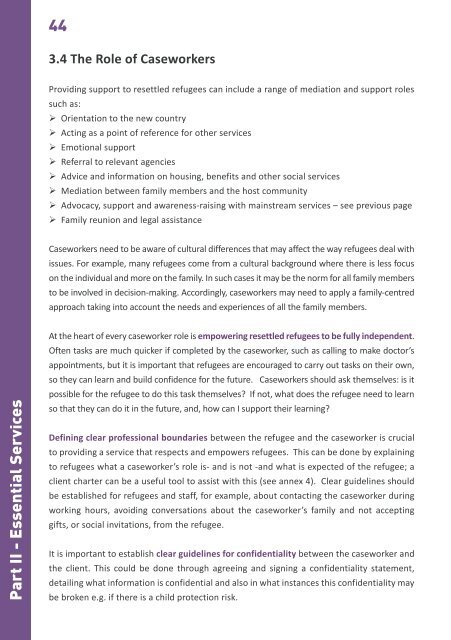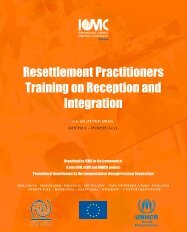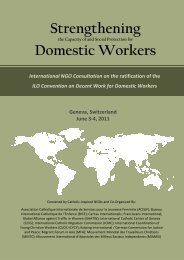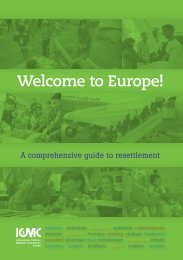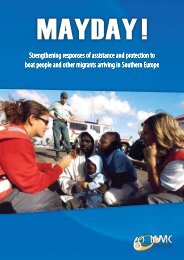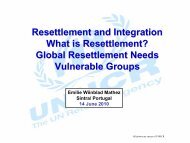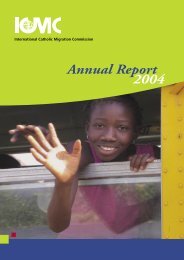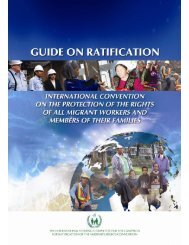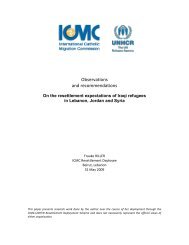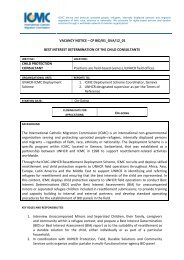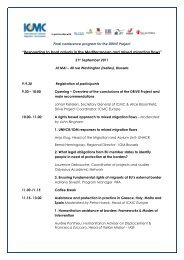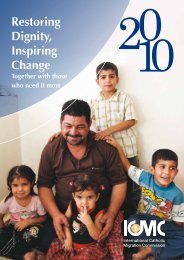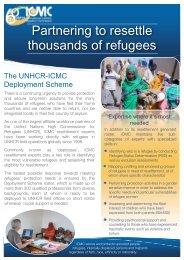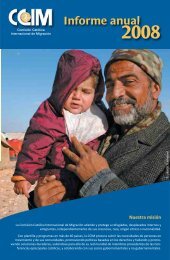'Paving the Way' Handbook - ICMC
'Paving the Way' Handbook - ICMC
'Paving the Way' Handbook - ICMC
Create successful ePaper yourself
Turn your PDF publications into a flip-book with our unique Google optimized e-Paper software.
44<br />
3.4 The Role of Caseworkers<br />
Providing support to resettled refugees can include a range of mediation and support roles<br />
such as:<br />
‣¾ Orientation to <strong>the</strong> new country<br />
‣¾ Acting as a point of reference for o<strong>the</strong>r services<br />
‣¾ Emotional support<br />
‣¾ Referral to relevant agencies<br />
‣¾ Advice and information on housing, benefits and o<strong>the</strong>r social services<br />
‣¾ Mediation between family members and <strong>the</strong> host community<br />
‣¾ Advocacy, support and awareness-raising with mainstream services – see previous page<br />
‣¾ Family reunion and legal assistance<br />
Caseworkers need to be aware of cultural differences that may affect <strong>the</strong> way refugees deal with<br />
issues. For example, many refugees come from a cultural background where <strong>the</strong>re is less focus<br />
on <strong>the</strong> individual and more on <strong>the</strong> family. In such cases it may be <strong>the</strong> norm for all family members<br />
to be involved in decision-making. Accordingly, caseworkers may need to apply a family-centred<br />
approach taking into account <strong>the</strong> needs and experiences of all <strong>the</strong> family members.<br />
Part II - Essential Services<br />
At <strong>the</strong> heart of every caseworker role is empowering resettled refugees to be fully independent.<br />
Often tasks are much quicker if completed by <strong>the</strong> caseworker, such as calling to make doctor’s<br />
appointments, but it is important that refugees are encouraged to carry out tasks on <strong>the</strong>ir own,<br />
so <strong>the</strong>y can learn and build confidence for <strong>the</strong> future. Caseworkers should ask <strong>the</strong>mselves: is it<br />
possible for <strong>the</strong> refugee to do this task <strong>the</strong>mselves? If not, what does <strong>the</strong> refugee need to learn<br />
so that <strong>the</strong>y can do it in <strong>the</strong> future, and, how can I support <strong>the</strong>ir learning?<br />
Defining clear professional boundaries between <strong>the</strong> refugee and <strong>the</strong> caseworker is crucial<br />
to providing a service that respects and empowers refugees. This can be done by explaining<br />
to refugees what a caseworker’s role is- and is not -and what is expected of <strong>the</strong> refugee; a<br />
client charter can be a useful tool to assist with this (see annex 4). Clear guidelines should<br />
be established for refugees and staff, for example, about contacting <strong>the</strong> caseworker during<br />
working hours, avoiding conversations about <strong>the</strong> caseworker’s family and not accepting<br />
gifts, or social invitations, from <strong>the</strong> refugee.<br />
It is important to establish clear guidelines for confidentiality between <strong>the</strong> caseworker and<br />
<strong>the</strong> client. This could be done through agreeing and signing a confidentiality statement,<br />
detailing what information is confidential and also in what instances this confidentiality may<br />
be broken e.g. if <strong>the</strong>re is a child protection risk.


